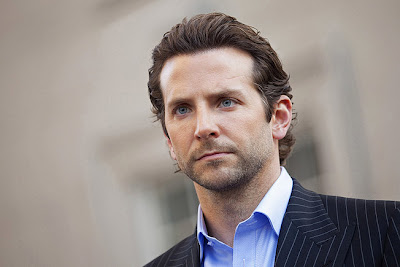After the last few weeks of bombardment from Battle Los Angeles and No Strings Attached, a quick fix of intelligence sounds just as appealing to me as it does to Bradley Cooper's character in the new sci-fi thriller Limitless. Chuck in the fact that he's a struggling writer who quickly gets stressed out when more stuff comes into his life, and it could have been made for me.
Eddie is our hero's name, and it's purely by chance that he's fixed up with an experimental drug called NZT, by his scummy ex-brother-in-law. NZT is a transparent tablet, about the size of an aspirin, but its consumption stimulates the receptors of the human brain and boosts the body's access to its potential. Eddie begins quaffing pills right away, little realising the price of his newfound intelligence.
For a while, Limitless was reminding me of Fight Club, in places replicating that film's dark humour, mode of storytelling, and overwhelming righteous anger at The Way Things Are. Certainly, it is to Bradley Cooper what Fight Club was to Brad Pitt, giving Cooper a chance to really work his acting chops and open him up to a second appraisal after the frat comedies and romcoms he's made his name in. And while we're talking about Cooper, I was very impressed at how he convinced me as a loser just as much as he convinced as the successful and handsome bloke he really is, later on in the film. But it took a while longer for me to twig exactly what the film reminded me of as a whole, and that's Unbreakable.
NZT effectively makes Eddie into a man of superhuman intelligence, not only able to recall everything he has ever learned and apply it to his current life but also capable of learning new things at an exponential rate. If they'd wanted to take it that way, the filmmakers could have made this a superhero origin story. But while Bruce Willis' character in Unbreakable was a suburban Superman, his invulnerability seemingly natural, Eddie's powers are fuelled by narcotics, but more pertinently, using hypothetical science that messes with nature, in the view of fuddy-duddy conservative Hollywood.
So it's a Faustian tale, and thusly, the pitfalls of addiction are thoroughly examined. As you might expect of a pill sourced from a random acquaintance with a history of being an unreliable drug dealing bastard, it has chemical faults that manifest themselves in the course of Eddie's addiction, but that's not all. The title is Limitless, but Eddie's intellectual omnipotence isn't immune to other people. While you can anticipate the greed of others or, as the film puts it, the human tendency to overreach, you can't always stop external forces from messing up your life.
Director Neil Burger pulls off a great bit of visual storytelling in representing Eddie's addiction. In the beginning of the story, the visuals are bleached, drab and milky. When Eddie first swallows that clear pill and lets it take effect, the world brightens up, illuminated by sunshine and broadened by a wide-angle lens that allows him to see everything in front of him. In a period where he goes cold turkey, it's drab and milky again, but still clear. And once he's fixed up again, that sunshine starts to look awful bright. Blinding, even. The effects don't change, but the context does, and it's very clever stuff.
But unfortunately, the limits of the film aren't just within the story- they're outside of it too, in the script and in the production. With a great head of momentum building between Eddie's successes and his addiction to the drug, the film ultimately doesn't have enough in it to give us a strong conclusion. It does that thing that annoyed me in The Adjustment Bureau, of jumping forward in time, but these scenes feels after the fact in the wake of the climactic scenes preceding it. As is human nature then, the film overreaches.
This is where the comedown begins. You gradually begin to realise that the film isn't as clever as it thinks, or indeed, as clever as you thought up until that point. The high of the earlier part of the film begins to dissipate, and coming down allows you to realise, as you plummet towards the credits and then walk out of the cinema, that you can't account for certain plotholes. Is that subplot really not going to come back? Is that really it for that character? Wait, what was that all about? And one of the early highlights of the movie, when Eddie outright asks the audience what they would do in his situation, given the risk, is negated by the way the film closes the book on any persistent ambiguities about the pros and cons of NZT.
Another recent Faust-inspired movie, Philip Ridley's Heartless, had more heart than the title would suggest. Similarly, Limitless is a good film, but one with more inhibitions than either its title or its pacey swagger would suggest. I was enthralled enough by the premise and Bradley Cooper's performance to give it a rock-solid recommendation, and I stand by that. However, its inconsistencies and its closed-minded conclusion mean that ironically, it's a film for which you might need to leave your brain at the door, if only to avoid the subsequent comedown.
Limitless is now showing in cinemas nationwide.
------------------------------------------------------------------
If you've seen Limitless, why not share your comments below? And yes, I know Robert DeNiro was in this too. When he gives an interesting performance, I'll have something to say.
I'm Mark the mad prophet, and until next time, don't watch anything I wouldn't watch.
LIMITLESS- Review
2:00:00 AM
bradley cooper
cinema
faust
films
limitless
movies
reviews
robert deniro
science fiction
thriller


